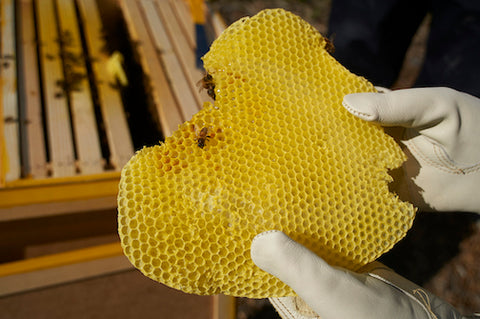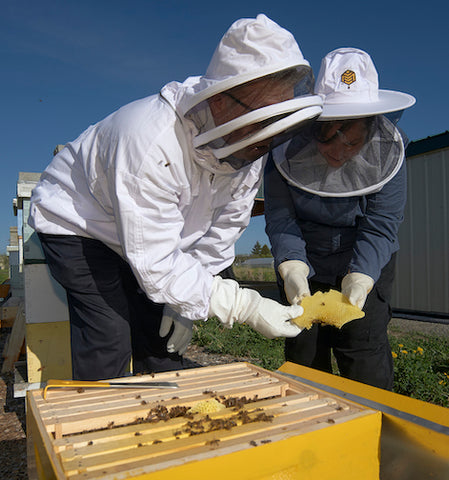Bozeman campus gets into bee farming
Bozeman campus expands university’s farm-to-campus efforts

By Anne Cantrell
BOZEMAN — Bozeman's campus is buzzing with plans to produce honey from its own honeybee colony.
In May, Montana State University's culinary team released bees at a new wooden hive – painted gold in honor of MSU – on the university’s horticulture farm west of campus.
The bees came from the Montana Honey Bee Company in Bozeman, and the hive came from the Polson Honey Bee Company.
A few thousand bees were delivered, Jill Flores, MSU executive chef said, and more are expected to hatch. A typical colony usually has 30,000 to 60,000 bees, she said.
Flores said it’s uncertain how much honey the bees will produce at first. She anticipates the honey that is produced will be used in the special farm-to-campus themed dinners Culinary Services hosts on campus, such as the first dinner of the fall semester, which is a picnic on the Romney Oval. The university will continue to purchase honey from local producers, as well.
One reason Culinary Services opted to purchase the hive was for the educational opportunities it will enable. Culinary Services has created educational posters about honeybees to share with students and engaged students via social media to name the queen bee. Out of more than 400 suggestions, Queen Freddie MercurBee was the winning name.

To support healthy populations of bees and other pollinators, MSU recently joined a nationwide initiative certifying the university's pollinator-friendly practices and programs, an effort that led to its designation as a Bee Campus USA by the international nonprofit Xerces Society for Invertebrate Conservation. MSU was the first Montana campus to qualify and enroll; the program also includes 58 other campuses nationwide.MSU is also home to the Pollinator Health Center, which carries out research that aims to improve pollinator health, mitigate pollinator losses and engage with learners of all ages at educational events.
Montana State University buys honey as well as meat, vegetables, fruits and other ingredients directly from more than 100 Montana producers, including purchases of beef, pork, lamb and goat from MSU programs, according to Kara Landolfi, MSU’s Farm to Campus coordinator.
Landolfi said the honeybees are an extension of edible landscaping that is present on campus and used by Culinary Services. Working in collaboration with MSU Facilities Services, Culinary Services harvests fruit, herbs and edible flowers that grow on the MSU campus. Those edibles include apples, crabapples, cedar, parsley, chives, nasturtiums and violets, she said.
MSU Culinary Services provides more than 12,000 meals in its dining facilities each day during the academic year, Flores said.




Leave a comment